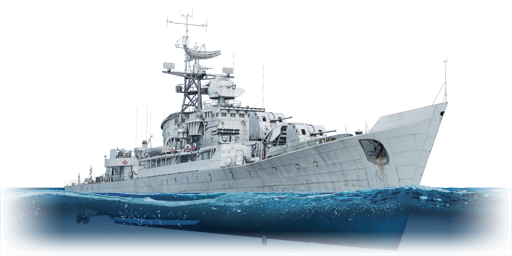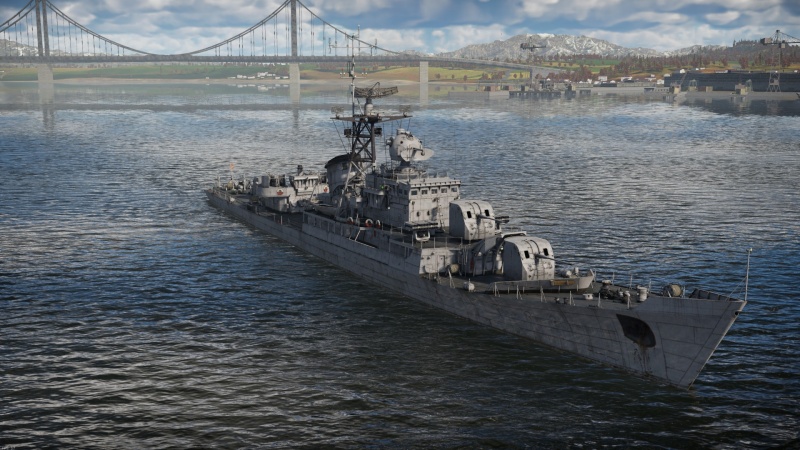Karl Marx
Contents
Description
The Pr.50, Karl Marx is a squadron rank IV German frigate with a battle rating of 4.0 (AB/RB/SB). It was introduced in Update "Wind of Change".
The Karl Marx is a squadron vehicle equivalent of the Yenot.
General info
Survivability and armour
Talk about the vehicle's armour. Note the most well-defended and most vulnerable zones, e.g. the ammo magazine. Evaluate the composition of components and assemblies responsible for movement and manoeuvrability. Evaluate the survivability of the primary and secondary armaments separately. Don't forget to mention the size of the crew, which plays an important role in fleet mechanics. Save tips on preserving survivability for the "Usage in battles" section. If necessary, use a graphical template to show the most well-protected or most vulnerable points in the armour.
Mobility
Write about the ship's mobility. Evaluate its power and manoeuvrability, rudder rerouting speed, stopping speed at full tilt, with its maximum forward and reverse speed.
| Mobility Characteristics | |||
|---|---|---|---|
| Game Mode | Upgrade Status | Maximum Speed (km/h) | |
| Forward | Reverse | ||
| AB | |||
| Upgraded | 77 | 27 | |
| RB/SB | |||
| Upgraded | 55 | 20 | |
Modifications and economy
Armament
Primary armament
Provide information about the characteristics of the primary armament. Evaluate their efficacy in battle based on their reload speed, ballistics and the capacity of their shells. Add a link to the main article about the weapon: {{main|Weapon name (calibre)}}. Broadly describe the ammunition available for the primary armament, and provide recommendations on how to use it and which ammunition to choose.
| Penetration statistics | |||||||
|---|---|---|---|---|---|---|---|
| Ammunition | Type of warhead |
Penetration @ 0° Angle of Attack (mm) | |||||
| 100 m | 1,000 m | 2,000 m | 3,000 m | 4,000 m | 5,000 m | ||
| F-56 HE | HE | 24 | 24 | 24 | 24 | 24 | 24 |
| ZS-56 HE | HE-TF | 24 | 24 | 24 | 24 | 24 | 24 |
| ZS-56R HE-VT | HE-VT | 16 | 16 | 16 | 16 | 16 | 16 |
| Shell details | ||||||||||||
|---|---|---|---|---|---|---|---|---|---|---|---|---|
| Ammunition | Type of warhead |
Velocity (m/s) |
Projectile mass (kg) |
Fuse delay (m) |
Fuse sensitivity (mm) |
Explosive mass (TNT equivalent) (kg) |
Ricochet | |||||
| 0% | 50% | 100% | ||||||||||
| F-56 HE | HE | 900 | 15.8 | 0 | 0.1 | 1.93 | 79° | 80° | 81° | |||
| ZS-56 HE | HE-TF | 900 | 15.6 | 0 | 0.1 | 1.93 | 79° | 80° | 81° | |||
| Proximity-fused shell details | ||||||||||||
|---|---|---|---|---|---|---|---|---|---|---|---|---|
| Ammunition | Type of warhead |
Velocity (m/s) |
Projectile mass (kg) |
Fuse delay (m) |
Fuse sensitivity (mm) |
Arming distance (m) |
Trigger radius (m) |
Explosive mass (TNT equivalent) (kg) |
Ricochet | |||
| 0% | 50% | 100% | ||||||||||
| ZS-56R HE-VT | HE-VT | 900 | 15.9 | 0 | 0.1 | 270 | 15 | 1.23 | 79° | 80° | 81° | |
Secondary armament
Some ships are fitted with weapons of various calibres. Secondary armaments are defined as weapons chosen with the control Select secondary weapon. Evaluate the secondary armaments and give advice on how to use them. Describe the ammunition available for the secondary armament. Provide recommendations on how to use them and which ammunition to choose. Remember that any anti-air armament, even heavy calibre weapons, belong in the next section. If there is no secondary armament, remove this section.
- Universal: HEF-T · AP-T · HEF-T · HEF-T · AP-T
- 37 mm HE clips: HEF-T · HEF-T · HEF-T · HEF-T · AP-T
- 37 mm AP clips: AP-T · AP-T · AP-T · AP-T · HEF-T
| Penetration statistics | |||||||
|---|---|---|---|---|---|---|---|
| Ammunition | Penetration @ 0° Angle of Attack (mm) | ||||||
| 10 m | 100 m | 500 m | 1,000 m | 1,500 m | 2,000 m | ||
| HEF-T | 3 | 3 | 3 | 3 | 3 | 3 | |
| AP-T | 79 | 76 | 63 | 51 | 41 | 32 | |
| Shell details | ||||||||||||
|---|---|---|---|---|---|---|---|---|---|---|---|---|
| Ammunition | Velocity (m/s) |
Projectile mass (kg) |
Fuse delay (m) |
Fuse sensitivity (mm) |
Explosive mass (TNT equivalent) (g) |
Ricochet | ||||||
| 0% | 50% | 100% | ||||||||||
| HEF-T | 880 | 0.72 | 0 | 0.1 | 56.98 | 79° | 80° | 81° | ||||
| AP-T | 880 | 0.76 | - | - | - | 47° | 60° | 65° | ||||
Additional armament
Describe the available additional armaments of the ship: depth charges, mines, torpedoes. Talk about their positions, available ammunition and launch features such as dead zones of torpedoes. If there is no additional armament, remove this section.
Usage in battles
Compared to other frigates, the Karl Marx has better firepower than most with the exception of late Japanese and British frigates. The biggest downside this ship faces is the reload time. Most frigates such as SKRs and the Köln-class will outgun the Karl Marx.
The Karl Marx is best played at a range farther than most frigates. This will give the ship better time to respond to threats and keep it away from heavy enemy fire, almost like a mini-destroyer. Like many frigates, focus on small targets such as boats, then frigates, then destroyers. Do not rely heavily on AA as much as other ships such as the Köln as it traverses terribly and has no HE-VT shells. Instead, use any HE-VT or time-fused shells in advance.
Pros and cons
Summarise and briefly evaluate the vehicle in terms of its characteristics and combat effectiveness. Mark its pros and cons in the bulleted list. Try not to use more than 6 points for each of the characteristics. Avoid using categorical definitions such as "bad", "good" and the like - use substitutions with softer forms such as "inadequate" and "effective"
Pros:
- Has access to radar
- Great firepower
- Has access to HE-VT shells on main armament
Cons:
- No autoloader (stuck with base 5.2 second reload)
- Horrendous traverse speed on dual 37 mm AA
- Outclassed by other frigates at its BR
History
Describe the history of the creation and combat usage of the ship in more detail than in the introduction. If the historical reference turns out to be too long, take it to a separate article, taking a link to the article about the ship and adding a block "/History" (example: https://wiki.warthunder.com/(Ship-name)/History) and add a link to it here using the main template. Be sure to reference text and sources by using <ref></ref>, as well as adding them at the end of the article with <references />. This section may also include the ship's dev blog entry (if applicable) and the in-game encyclopedia description (under === In-game description ===, also if applicable).
Media
Excellent additions to the article would be video guides, screenshots from the game, and photos.
See also
Links to articles on the War Thunder Wiki that you think will be useful for the reader, for example:
- reference to the series of the ship;
- links to approximate analogues of other nations and research trees.
External links
Paste links to sources and external resources, such as:
- topic on the official game forum;
- other literature.
| Yantar Baltic Shipyard (Прибалтийский судостроительный завод «Янтарь») | |
|---|---|
| Frigates | |
| Project 50 | Yenot · Rosomacha · Karl Marx* |
| Project 35 | SKR-7 |
| *Tur in East German service | |
| Germany frigates | |
|---|---|
| |
Kriegsmarine |
| K-class | K2 |
| |
Bundesmarine |
| Köln-class | Köln · Lübeck |
| |
Volksmarine |
| Pr. 50 | Karl Marx |
| Squadron ships | |
|---|---|
| Germany | Karl Marx |
| USSR | SKR-7 |
| Britain | HMS Liverpool |
| Japan | IJN Shimakaze |





